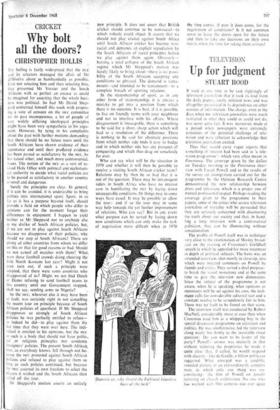Why bolt all the doors?
CRICKET .1-14
CHRISTOPHER HOLLIS
The feeling is fairly widespread that the mcc and its selectors managed the affair of Mr d'Oliveira about as hamhandedly as possible. First not selecting him and then selecting him, they presented Mr Vorster and the South Africans with as perfect an excuse as could be imagined for asserting that the whole busi- ness was political. So had Ms- David Shep- pard contented himself this week with propos- ing a vote of censure on the MCC committee for its past incompetence, a lot of people of very widely differing ideological principles might have been very sympathetic to his argu- ment. However, by tying in his complaints about the past with further motions demanding that there should be no future tours until the South Africans have shown evidence of their repentance and until their proffered evidence has been passed as satisfactory by the mcc, he has raised other, and much more controversial, issues. The notion of the mcc as a sort of re- vived Holy Office with political and ecclesiasti- cal authority to decide what racial policies are to be passed as satisfactory in another country is novel and dangerous.
Surely the principles are clear. In general, if it can be avoided, it is undesirable to bring politics into international sport. Sport, in so far as it has a purpose beyond itself, should provide a field on which people who differ in opinions can for the moment forget their differences in enjoyment. I happen to yield neither to Mr Sheppard nor to anybody else in my dislike of South African policies, but, if we are not to play against South Africans because we disapprove of their policies, why. should we stop at South Africans? There are plenty of other countries from whom we differ on this or that for good reasons or bad. Should we not cancel all matches with them? What; were those football crowds doing cheering the little" North Koreans last year? Might it not even turn out, if such a principle were adopted, that there were some countries who disapproved of us? Might we not find Dutch or Danes refusing to send football teams to this country until our Government stopped, shall we say, sending arms to Nigeria?
So the mcc, wherever else it may have been at fault, was certainly right in not cancelling the recent tour on principle because of South African policies of apartheid. If Mr Sheppard disapproves so strongly of South African policies he was perfectly entitled to refuse— as indeed he did—to .play against them the last time that they were over here. The indi- vidual is entitled to his opinions, but the mcc as such is a body that should not have politi-6. cal or religious principles nor condemn foreigners' policies. The present South Africatt, tour, as everybody knows, fell through not cause the mec protested against South African Policies and refused to play against them so long as such policies continued, but because the MCC asserted its own freedom to select the Players it wished and the South Africans then :ailed off the tour.
Mr Sheppard's motion asserts an entirely
new principle. It does not assert that British ciicket should continue to be non-racial—to which nobody could object. It asserts that we should not play cricket against South Africa until South African cricket has become non- racial and demands an explicit repudiation by the South Africans of racial principles before we play against them again. Obviously— barring a total collapse of the South African regime which Mr Sheppard's motion was hardly likely to bring about—there is no possi- bility of the South Africans accepting any conditions so phrased. The demand is tanta- mount—and intended to be tantamount—to a complete breach of sporting relations.
In the statesmanship of sport, as in any other form of statesmanship, it is always a mistake to get into a position from which there is no outcome. It is best, if it is possible, to live on friendly terms with your neighbour and not to interfere with his affairs. Where disagreement is inescapable, there is something to be said for a short, sharp action which will lead to a resolution of the difference. There is nothing to be said for obstinate positions from which neither side finds it easy to budge and in which neither side has any prospect of conquering and which thus drag on senselessly for ever.
Who can say what will be the situation in 1970 and whether it will then be possible to receive a visiting South African cricket team? Relations may by then be so bad that it is out of the question. There may be intransigent rulers in South Africa who have no interest' save in humiliating the mcc by laying down unacceptable conditions. Or things may in some ways have eased. It may be possible to allow the tour: and if so the tour may in sorne way help towards the yet further improvement
of relations. Who can say? But in any event what purpose can be served by laying down now conditions which can only make the task of negotiation more difficult when in 1970
Danunit sir, why should the Falkland Islanders have all the luck?' the time comes, if ever it does come, for the negotiation of conditions? Is it not common sense to lease the doors open for the future and then to take our decisions on their own merits when the time for taking them arrives?


































 Previous page
Previous page